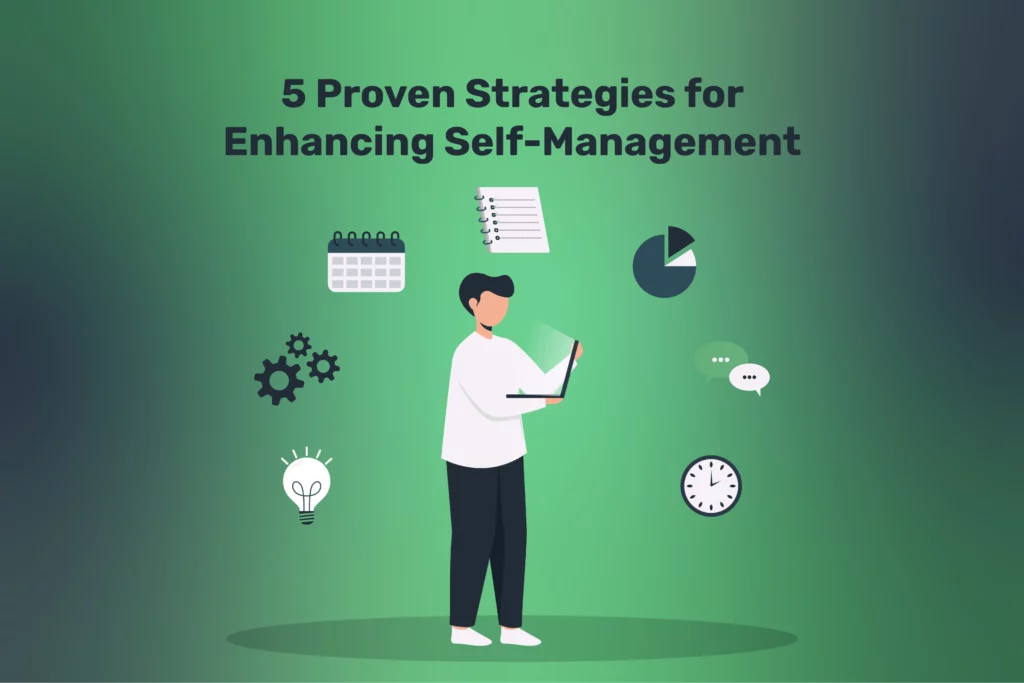We all strive for control—over our careers, relationships, and even our emotions. But in the whirlwind of daily life, it often feels like we are being swept along by external forces, leaving our sense of agency and well-being in the dust. This is where self-management steps in, offering a super powerful tool to navigate the complexities of life with intention and purpose.
But what exactly is self-management, to begin with? It is not about ticking boxes and becoming a rigid taskmaster, but instead it is cultivating awareness of your thoughts, feelings, and behaviours and developing the skills to guide them effectively. It is about taking charge of your time, energy, and resources, setting goals that resonate with your values, and navigating challenges with resilience and grace.
In this article, we will delve into the realm of self-management, offering powerful strategies to empower you and optimise your personal and professional growth. Let’s rewrite the narrative—from feeling pulled in a million directions to confidently steering your course towards the life you desire. Are you ready to take the wheel?
6 Key Strategies to Enhance Self-Management

Self-management is the ability of an individual to regulate and control their own behaviours, emotions, and actions so as to achieve personal and professional goals. It involves taking responsibility for one’s actions, making informed decisions, and effectively managing one’s time and resources.
Self-management is a crucial skill in all aspects of life as it often leads to:
- Increased productivity and efficiency at work or school.
- Improved relationships with family, friends, and colleagues.
- Greater personal well-being and happiness.
- Enhanced emotional intelligence and self-awareness.
- Stronger ability to achieve goals and overcome challenges.
Like with all other skills, self-management is a continuous journey, not a destination. It takes practice, self-reflection, as well as the willingness to learn and grow. While there are indeed many resources available to help you improve your self-management skills, from books and articles to courses and coaching programmes, we are offering you the five most essential strategies to help you gain better control over your life.
So, let’s explore those.
1. Cultivate Self-Awareness
Cultivating self-awareness is a valuable skill that involves developing a profound understanding of your thoughts, emotions, and behaviours, and it can be done through a series of various practices.
First of all, set aside time regularly for self-reflection. This can be done through journaling or simply taking a few moments to think about your experiences and reactions. Ask yourself various questions about your thoughts, feelings, and actions and consider what went well, what could be improved, and why you responded in a certain way. Reflect on your past experiences, achievements, and challenges to identify recurring themes and patterns.
Speaking of journaling, it is recommended to keep a journal specifically focused on your emotions. Record the feelings you experience throughout the day and try to identify the events or thoughts that triggered them. This practice can help you recognise patterns and reach a better understanding of your emotional responses.
Personality tests and assessments can be a starting point for self-discovery and a way to gain insights into your preferences, tendencies, and behaviours. You may also ask for feedback about your strengths and areas of improvement from those you trust. Be open to constructive criticism and use it as an opportunity for growth.
You should also practise mindful meditation to bring your attention to the present moment. This can help you observe your thoughts without judgement. Focus on your breath, sensations in your body, or the sounds around you. When your mind wanders, gently bring your attention back to the present.
Another way to develop mindfulness is to practise active listening during conversations. Focus on truly understanding the perspectives of others without immediately forming your response, and pay attention to your own reactions and emotions during these interactions.
If you feel such practices are not so much of a help, consider seeking professional aid from qualified therapists or coaches who specialise in self-awareness and personal development. They can provide guidance, ask thought-provoking questions, and offer support in your journey toward greater self-awareness.
2. Set Clear Goals
Setting clear goals is pivotal for achieving success, maintaining focus, and, therefore, gaining self-management. One efficient way to do that is by using the SMART technique to ensure your goals are Specific, Measurable, Achievable, Relevant, and Time-bound.
More elaborately, you can make your goal specific by clearly stating what you want to accomplish. Include metrics to track your progress and determine when you have achieved the goal and, therefore, make it measurable. You should ensure the goal is attainable with effort and aligned with your overall objectives and values. Finally, set a deadline for achieving the goal to create a sense of urgency.
Now that you have set a SMART goal, here are some more tips to help you achieve it:
- Break Your Goal Down: If your goal is large and complex, break it down into smaller, more manageable tasks. This makes it more achievable and allows you to track progress more effectively.
- Write It: Putting your goal in writing makes it more tangible and helps solidify your commitment. Use clear and concise language, and consider creating a visual representation, such as a vision board.
- Prioritise It: Determine the importance of your goal and prioritise it based on its impact on your overall objectives.
- Create an Action Plan: Outline the specific steps you need to take to reach your goal. This does provide a roadmap for implementation and helps you stay organised.
While working toward your goals, you have to regularly review them to track progress and make any necessary adjustments. If circumstances change or if you encounter unforeseen challenges, be flexible in modifying your goals accordingly. You can also increase your odds of achieving your goals by sharing them with a trusted companion, mentor, or colleague who can provide support and hold you accountable.
Once you hit a milestone, acknowledge and celebrate it, no matter how small it is. This reinforces a positive mindset and motivates you to continue working towards your larger goals. As you move on toward the next milestone, keep the bigger picture in mind and remind yourself of the reasons behind your goals. This also helps maintain motivation, especially during challenging times.
3. Develop Time Management Skills

Developing time management skills is essential for maximising productivity, gaining self-management skills, and achieving personal and professional goals. While setting clear goals is a huge time saver and often provides a sense of direction and purpose, let’s explore some more strategies to have control over your time.
- Prioritise Tasks: Use methods like the Eisenhower Matrix to distinguish between urgent and important tasks. Prioritise high-impact tasks that align with your goals.
- Create a To-Do List: Maintain a daily or weekly to-do list. Update your list regularly and check off completed tasks. Also, group similar tasks together and complete them in batches to minimise the mental effort required to switch between different types of activities.
- Use a Planner or Calendar: Utilise a planner or digital calendar to schedule appointments, deadlines, and tasks. This helps you visualise your time and allocate it efficiently.
- Time Blocking: Allocate particular blocks of time for various activities. This prevents multitasking and allows you to focus on one task at a time. Besides, having a time limit creates a sense of urgency and helps prevent tasks from expanding beyond their necessary scope.
- Eliminate Time Wasters: Identify and minimise activities that take more of your time without contributing to your goals. This may include excessive social media usage, unnecessary meetings, or other distractions.
While all of these techniques will surely help you get more done, feel more productive, and gain more momentum that will even help you achieve more, there is still one thing you need to do to guarantee you stay on track. That is to recognise your limits. Delegate all tasks that can be handled by others, and do not hesitate to decline what may interfere with your existing priorities.
Also, remember to incorporate short breaks during your workday. Those can help refresh your mind and improve overall focus and productivity.
4. Practise Self-Discipline
The fourth strategy to enhance your self-management skills is to practise self-discipline.
Self-discipline is this ability to stay focused and committed to your targets, even in the face of distractions and temptations. In other words, it is self-control combined with persistence and motivation. Instead of being impulsive or swayed by momentary desires, you develop a consistent course of action driven by long-term goals and priorities.
Self-discipline is like a muscle—the more you train it, the stronger it becomes. Some of the strategies we mentioned earlier, like setting SMART goals, managing time, rewarding yourself, and finding an accountability partner, definitely help strengthen your self-discipline muscle. Here are some more:
- Start Small and Specific: Do not overwhelm yourself with drastic changes. Begin with a small, achievable goal, like meditating for five minutes daily or reading ten pages before bed. Consistency is key, so focus on doing something manageable every day.
- Develop a Strong Why: Clearly understand the reasons behind your goals. A strong sense of purpose enhances motivation and helps you stay committed to the disciplined path.
- Embrace the Power of Habit: Tie your new discipline to an existing habit. For example, do push-ups every time you brush your teeth or write in your journal right after breakfast. This creates a routine that makes the new behaviour automatic.
- Prepare in Advance: Laying out clothes for the next day, preparing healthy snacks, and having your gym bag ready all help stick to your habits, avoid excuses, and cut out hesitation.
- Focus on Progress, Not Perfection: Remember, self-discipline is a journey, not a destination. Celebrate your progress, no matter how small, and keep moving forward.
It is also important not to overlook things like getting enough sleep for a well-rested brain can make better decisions and resist temptations more effectively. Physical activity also boosts energy levels, mood, and overall well-being. Besides, if you slip up sometimes, just forgive yourself, learn from the experience, and get back on track.
5. Manage Stress and Emotions
Effective self-management involves regulating your emotions and managing stress. This is crucial for overall well-being, impacting both physical and mental health in profound ways.
Practising mindfulness, deep breathing exercises, and relaxation techniques proved to reduce anxiety and promote mental well-being. Seeking support from friends, family, or professional counsellors when needed, prioritising self-care activities to recharge and rejuvenate, eating a balanced diet, and sleeping well also highly impact mental health and help regulate feelings of anxiety and confusion.
Other strategies to manage stress and handle emotions include:
- Identifying and Challenging Negative Thoughts: Pay attention to self-talk and replace negative thoughts with more realistic and helpful ones.
- Practising Gratitude: Reflect on the things you are grateful for, which can shift your perspective and boost positive emotions.
- Problem-Solving: Break down large problems into smaller, manageable steps. Develop constructive solutions and focus on what you can control.
- Spending Time With Loved Ones: Strong social connections provide support and a sense of belonging, which can buffer the effects of stress.
- Spending Time in Nature: Immersing yourself in nature can be calming and restorative.
- Engaging in Hobbies: Do activities you enjoy which can provide relaxation and pleasure.
- Limiting Screen Time: Excessive screen time can contribute to stress and anxiety.
Yet, always remember that the most effective approach will vary according to your individual needs and preferences. Experiment with different strategies and find what works best for you. It is also important to note that these tips are not a substitute for professional help. If you are struggling to manage stress or emotions on your own, consider reaching out to a therapist or other mental health professional.
Conclusion
Mastering self-management is a transformative journey that empowers individuals to navigate life’s complexities with resilience and purpose and a profound investment in one’s own well-being. Yet, it is also a lifelong journey that requires dedication and continuous effort. By constantly implementing the strategies outlined in this article, you can achieve your goals and cultivate a greater sense of fulfilment in your personal and professional life.


